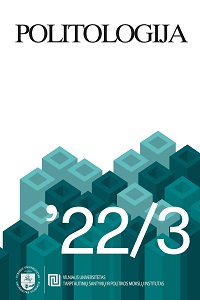Populistinės nuostatos ir balsavimas: ar populistines nuostatas turintys rinkėjai balsuoja už naująsias partijas? (2016 metų Seimo rinkimų atvejis)
Populist Attitudes and Voting: Does Populist Voters vote for New Political Parties? (The Case of 2016 Seimas Elections?)
Author(s): Paulius SkirkevičiusSubject(s): Government/Political systems, Electoral systems, Political behavior, Comparative politics
Published by: Vilniaus Universiteto Leidykla
Keywords: new parties; populism; electoral behaviour;
Summary/Abstract: Concerning the success of new/renewed political parties in Lithuania, quite often they are labelled as populist ones. This article seeks to answer the question – do populist attitudes of individuals could be variable that explains voting for new political parties? Firstly, we analyse the structure of populist attitudes in Lithuania. The analysis using attitudes measures suggested by CSES revealed that these attitudes fit theoretical expectations quite well. Two dimensions of populist attitudes can be distinguished – anti-elitism and the one concerning people’s role in politics. Further analysis of electoral behaviour, that populist attitudes does not explain voting for the new political party, other variables such as political support/ trust does explain it better. However the analysis is limited to one elections and one political party, so the conclusions should be considered with caution and further analysis is needed.
Journal: Politologija
- Issue Year: 2022
- Issue No: 3 (107)
- Page Range: 51-89
- Page Count: 39
- Language: Lithuanian

